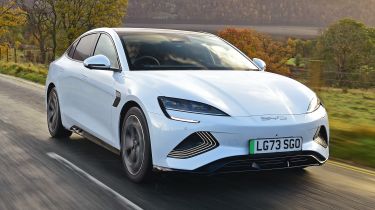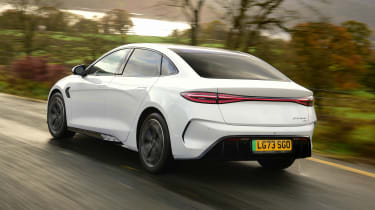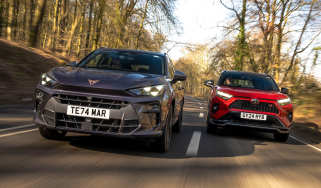BYD Seal review
The handsome BYD Seal puts forth a strong case for itself as a well-made, fine driving, and efficient electric vehicle

Is the BYD Seal a good car?
The BYD Seal is the Chinese brand’s most impressive UK offering to date, with excellent range, efficiency, and performance. It even has a well-finished interior with lots of standard equipment to give it the feel of a premium electric vehicle, so much so that it might make you think twice about a Tesla Model 3.
However, its high equipment levels and swift performance mean the Seal has a higher price than we’ve been used to from BYD. Whereas the brand’s other models have undercut rivals, the Seal is priced directly to compete with premium EV offerings - or, in the case of the Tesla Model 3, above them. We still think it's worth considering the Seal, but it opens the car up to closer scrutiny against rivals that are more fun to drive, charge faster, and offer greater practicality
| Key specs | |
| Fuel type | Electric |
| Body style | Four-door saloon |
| Powertrain | 82.5kWh battery, 1x e-motor (Design) rear-wheel drive 82.5kWh battery, 2x e-motor (Excellence AWD) four-wheel drive |
| Safety | 5-Star EuroNCAP (2023) |
| Warranty | 6yrs/93,750 miles |
How much does the BYD Seal cost?
BYD has some lofty ambitions with the Seal, as shown by its price, which starts at just under £46,000. That’s significantly more than the car the Seal has to beat in this sector, the Tesla Model 3. If you want a four-wheel drive Seal, then you’ll need to go for the top-of-the-range Excellence AWD at nearly £49,000.
While the pricing is certainly punchy, it also seems a little strange that a car maker would launch a saloon car when more and more buyers are defecting to SUVs, but the BYD Seal is not your normal compact executive saloon. It differs from rivals like the Audi A4, BMW 3 Series, and Mercedes C-Class in being an all-electric offering like the aforementioned Model 3. Going electric brings lower company car tax implications than hybrid or even plug-in hybrid alternatives, which is crucial in this market.
All versions of the Seal come with the same 82.5kWh (useable) battery size, with an overall driving range from the entry-level rear-wheel drive of 354 miles. That’s a mighty impressive number, and requires the far pricier 391-mile Dual-Motor Long Range version of Model 3 to beat it. However, it has been announced that the Seal is going to be updated soon with an upgraded battery that’s smaller in capacity at 80.6kWh. There is no word on whether the WLTP range will change, but we expect there to be some efficiency upgrades made to the electric motor to at least maintain or improve that figure.
For the current Seal, the entry-level rear-wheel drive Design trim has a specification that reads more like that of a luxury car than a fleet favourite company car. Every Seal comes with 19-inch alloy wheels, LED headlights, electrically adjustable heated and ventilated front seats, a surround-view camera system, a 12-speaker Dynaudio sound system, and an electric tailgate. The four-wheel drive Excellence model adds a head-up display and more sophisticated adaptive suspension.
The latter also gives you an electric motor in the front, making it four-wheel drive. It’s also the fastest Seal, with a 0-62mph time of just 3.8 seconds thanks to a mighty 530bhp on tap. That’s not to say that the entry-level rear-wheel drive Design model is a slouch, because it still has a not inconsiderable 312bhp to play with.
Electric motors, performance & drive
The BYD Seal is quick enough in our preferred rear-wheel drive Design trim with a 0-62mph time of just 5.9 seconds. It’s refined enough, but it needs a little more fine tuning to compete with the likes of the BMW i4. The accelerator could be a little more responsive, and we’d like a smoother transition between regenerative and mechanical braking systems. Read more about the BYD Seal's electric motors, performance and drive here…
Range, charging & running costs
The rear-wheel drive model is our preferred version because its official range of 354 miles compares well with similarly priced rivals. The Excellence AWD has proven to be less efficient than its rivals, which is a little concerning for long trips when the charging speed lags behind the class best. Predicted resale values are likely to be on par with its competition, but insurance is likely to be expensive, considering the Seal sits in some of the highest insurance groups. Read more about the BYD Seal's range, charging and running costs…
Interior, design & technology
A handsome exterior design and a classy interior built with plush materials help to give the BYD Seal the premium feel its price demands. You get a lot of equipment for your money, and the standard ventilated front seats are a nice touch considering the full-length glass roof will make things quite hot in summer. We doubt you’ll need a rotating central touchscreen, but at least the screen responds swiftly to inputs. We approve of the separate digital driver instrument cluster, because it puts important information, such as speed, within the driver’s line of sight. Read more about the BYD Seal's interior, design and technology…
Boot space, comfort & practicality
The Seal's 400-litre boot is smaller than its rivals, while its saloon body style means it can be restrictive when loading taller items in the boot. The useful 53-litre front boot is convenient for storing dirty charging cables, just like the Tesla Model 3. There’s enough space up front for a pair of six-foot adults to sit comfortably, with enough space left over for a pair of similarly sized grown-ups in the back – although their heads will be close to the roof. You get a pair of ISOFIX child seat points in the back and another on the front passenger seat. Read more about the BYD Seal's boot space, comfort and practicality…
Reliability & safety
It’s too early to judge what the long-term ownership experience of a BYD car will be like, given the company has only just arrived on our shores, although the long six-year/93,750-mile manufacturer’s warranty should provide some reassurances. It’ll be a safe car because it scored five stars in Euro NCAP crash testing, although the VW ID.7 scored better in each category. The battery pack is covered by an eight-year or 125,000-mile warranty, which is longer than most of its rivals. Read more about the BYD Seal's reliability and safety…
BYD Seal alternatives
It isn’t just the traditional German saloon car choices or the Model 3 with which the Seal must do battle with. There’s an array of other EV saloon offerings, such as the BMW i4, Hyundai Ioniq 6, and Volkswagen ID.7 that are all available with over 300 miles of range. Plus, you could also consider EVs like the Hyundai Ioniq 5, Kia EV6, Nissan Ariya, Volkswagen ID.4 and Skoda Enyaq that, while perhaps not offering quite the same overall driving range due to having less aerodynamic SUV-style shapes, do all offer greater versatility than a saloon.
The BYD Seal feels like a much more mature product than either of the brand’s previous electric cars, but with that comes a tangible price premium that puts this sleek saloon on par with (or even slightly above) rivals, rather than allowing it to undercut them. Don’t let that dissuade you, because this is a well-equipped, high-quality, admirably efficient and good-to-drive EV that stacks up well both on paper and in the real world. It provides a comfortable and refined driving experience for anyone after an electric car with which to cover long distances.
Just be aware that while it is a credible alternative to a Tesla Model 3, the Model 3 charges much faster despite coming in at a lower price than the Seal in entry-level rear-wheel drive form, and would be more suitable for those who have to rely on public charging. Plus, there’s the Volkswagen ID.7, which provides greater practicality than the Seal, or the BMW i4, which is nicer to drive for those who value a B road blast.
Frequently Asked Questions
The BYD Seal provides excellent range and lots of equipment for the money, although some rivals offer faster charging speeds and a sharper drive for less money.









